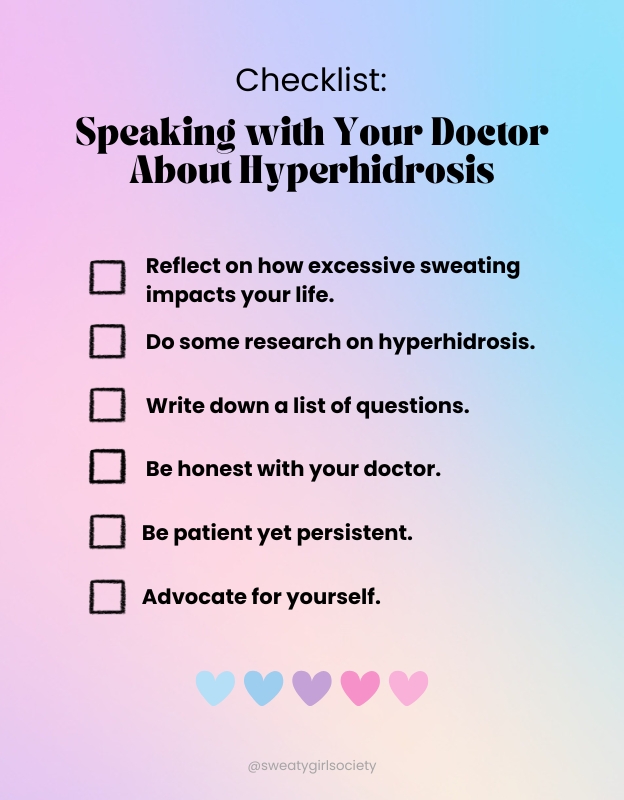Dear Sweaty Girl Society,
I’m pretty sure I have hyperhidrosis and I want to talk to my doctor about it, but I’m embarrassed and nervous. Do you have any tips for me?
Hey Sweaty Girl,
The first thing to know is this: Hyperhidrosis is a legit medical condition — and it’s more common than you might think.
In fact, over 385 million people live with hyperhidrosis, equating to about 5% of the world’s population.
Despite this, there’s a general reluctance to speak about hyperhidrosis with healthcare providers, and studies have shown that only 50% of people who suspect they have hyperhidrosis will discuss it with their doctor.
So you’re not alone — both in (likely) having hyperhidrosis, and in feeling hesitant to speak with your doctor about it.
And, I totally get it.
It took me 10 years to get a diagnosis, and I remember feeling nervous talking to my doctor. I was worried she’d dismiss me, or judge me — or even think my body was gross.
The thing is, by not speaking with your doctor, you could be doing yourself a disservice.
As you’re probably all too aware, hyperhidrosis can be a source of discomfort and it can interfere with your daily life. But, there are treatments available that your doctor can prescribe to help control your sweating and improve your quality of life.
Additionally, if you have what turns out to be secondary hyperhidrosis, the excessive sweating you’re experiencing could be an indication of other serious health issues.
So, as embarrassing and nerve-wracking as it is to speak with your doctor about excessive sweating, it’s best to get it checked out.
To help you prepare for your conversation, I’ve put together these 6 tips [plus scroll down for a printable checklist!].

6 tips for talking to your doctor about hyperhidrosis
1. Reflect on how excessive sweating impacts your life.
Before you head off to the doctor, take some time to think about your symptoms and how they affect your daily life.
Note how often you sweat, how intense your sweating is, and if there are any common triggers that can set you off. Do you sweat excessively in just one place on your body or do you sweat in multiple sites? Does your sweating interfere with work/school? Does it cause you emotional distress?
These are all questions your doctor might ask you, so it can be helpful to be prepared.
2. Do some research on hyperhidrosis.
Prior to your appointment, it can also be useful to read up on the latest information about hyperhidrosis.
A good place to start is with the International Hyperhidrosis Society’s website.
Having a baseline understanding of hyperhidrosis will equip you with the right language to use and can help you feel more confident when speaking with your doctor.
Just be aware of misinformation, and try to stick to reputable websites.
3. Write down a list of questions.
After you’ve done your preliminary research, make a list of questions that you still need answers to.
Jotting down your questions in a note app on your phone or on a piece of paper that you can take to your appointment will help you avoid forgetting them.
Here are some questions to get you started:
- What type of hyperhidrosis do I have?
- What’s causing my hyperhidrosis?
- What treatment options are available?
- Are there any side effects to the treatments?
- How effective are the treatments?
- What can I do to manage my symptoms at home?
- Where can I get help for the emotional distress I’m feeling?
- Where can I go for more support?
4. Be honest with your doctor.
Even though it might feel uncomfortable, try to be honest with your doctor about your experiences with excessive sweating.
Explain how hyperhidrosis affects all areas of your life — whether that’s physical discomfort, social isolation, work challenges, embarrassment, shame, anxiety, depression or something else.
Try not to downplay your symptoms. Doing so will only make it harder for your doctor to diagnose and treat you correctly.
Even though it’s scary to talk about hyperhidrosis if you’ve never been open about it before, try to remember that your doctor is there to help you.
5. Be patient yet persistent.
Diagnosing hyperhidrosis and finding the best treatment can take time. Don’t get discouraged if it doesn’t happen overnight.
For instance, antiperspirants and iontophoresis both take time to take effect, and finding the right medication dose might take some trial and error. Stick with your treatment plan and keep in touch with your doctor so they can track your progress.
6. Advocate for yourself.
That being said, if you feel your doctor isn’t taking your hyperhidrosis seriously or if you feel you’re being dismissed, it might be time to consider switching doctors.
Advocating for yourself is important. Hyperhidrosis is a serious medical condition — and you deserve to live the best quality of life possible!
Closing thoughts
Talking to your doctor about hyperhidrosis can be a daunting task, but living with excessive sweating in silence can be even more difficult.
Your doctor can help you get the support you need to manage your symptoms, mitigate your emotional distress and improve your overall quality of life.
You got this, Sweaty Girl. 🩷
Have a question for the Sweaty Girl Society community? DM us your questions on Instagram at @sweatygirlsociety.

![Sweaty Girl Society [Logo]](https://sweatygirlsociety.com/wp-content/uploads/2024/08/Sweaty-Girl-Society-Logo-100x100.png)


![When Does Hyperhidrosis Typically Start? [Age of Onset]](https://sweatygirlsociety.com/wp-content/uploads/2024/09/Age-of-Onset-for-Hyperhidrosis.jpg)